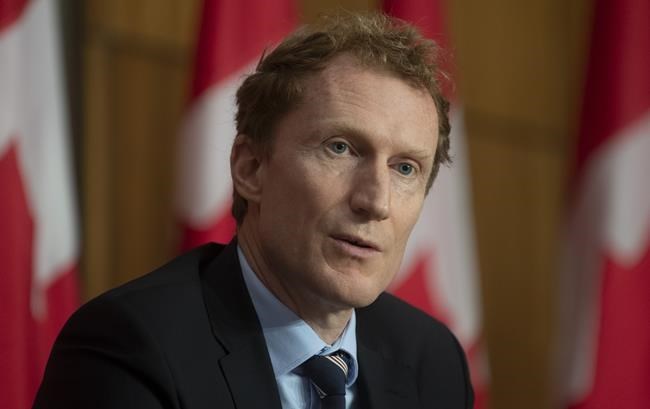Ottawa’s controversial legal challenge of a pair of rulings involving First Nations children torn from their families by a chronically underfunded childcare system heads to Federal Court Monday, despite repeated calls for the cases to be dropped in the name of reconciliation.
The federal government is poised to argue against two Canadian Human Rights Tribunal rulings. The first awarded what amounts to billions of dollars in compensation to First Nations children inappropriately taken away from their parents after 2006, and to their parents and grandparents.
The second ruling expands Jordan's Principle to children who live off-reserve or who are not registered under the Indian Act.
Jordan's Principle is a rule stating that when different levels of government disagree about who's responsible for providing services to First Nations children, they must help a child in need first and argue over the bills later. It was named after Jordan River Anderson, a boy from Norway House Cree Nation in Manitoba who died in hospital while the Manitoba and federal governments argued for five years over which who should pay for his care in a special home.
Cindy Blackstock, executive director of the First Nations Child and Family Caring Society, which filed the original human rights complaint over 14 years ago, says the case is fundamentally about addressing harms suffered by Indigenous children who have faced systemic discrimination by Canadian child welfare policies and practices.
"Frankly it disgusts me as a citizen to think that the government is spending taxpayer money and energy fighting against little kids that they have been found to be racially discriminating against in ways that harm them, separate them from their families and, in some cases, contribute to their death," Blackstock said.
But even while Ottawa is moving forward with its legal battle challenging the tribunal's rulings — despite repeated and growing calls to end the litigation — Liberal cabinet ministers and Prime Minister Justin Trudeau continue to insist they are in favour of compensating Indigenous children who were harmed by what they call a “broken child care system.”
Ottawa instead wants to compensate these children and their families through a settlement in two separate but related class-action lawsuits.
Indigenous Services Minister Marc Miller says such a settlement would pay out larger sums than the tribunal's maximum $40,000 award for each child, and would be able to offer compensation more proportional to the harms they endured.
"We do not deny that harm was suffered. We do not deny that the systemic discrimination exists," Miller told reporters last week.
"But it is very difficult to look at the CHRT tribunal, which can only award a maximum amount of $40,000. And it did so, we argued, in a way that wasn’t proportional, in a vacuum. And that is the subject matter that will be discussed principally in the court proceedings next week."
There has been a "convenient narrative" that government is dragging First Nations kids to court and refusing to pay, Miller says. But he argues this is simply not the case.
"We have been in complete compliance with orders as they have come out," Miller said.
"We have fundamental issues with the CHRT’s ruling, with its assertion of jurisdiction, without denigrating some of the great work that’s been done."
The tribunal's September 2019 ruling said Ottawa "wilfully and recklessly" discriminated against Indigenous children living on-reserve by not properly funding child and family services. As a result, children were sent away from their homes, families and reserves because if they lived off-reserve, they would be covered by better-funded provincial systems. Others were removed from their families because authorities couldn't provide supports to help keep them together.
In legal factums filed in Federal Court, Ottawa is arguing the human rights tribunal "erred in law" by "improperly" turning the case into a class action by awarding individual compensation. Since there were no individual or representative complainants, but rather the Caring Society making arguments on behalf of all First Nations kids inappropriately taken into care, federal lawyers argue the tribunal did not have the authority to award individual damages.
"The tribunal is not entitled to transform a complaint of systemic discriminatory underfunding into a complaint seeking individual compensation," the government's factum says.
"Doing so is inconsistent with both the tribunal’s authority to hear the complaint and its authority to remedy it."
Ottawa does not argue that systemic underfunding affected children, the factum states, arguing it is instead an issue of whether the tribunal, rather than the Federal Court, was the appropriate forum in which to award compensation to individual children and families.
In its arguments against the broadening of Jordan's Principle, the federal government argues the tribunal's ruling "transformed" Jordan’s Principle from a resolution, passed in the House of Commons aimed at ensuring jurisdictional wrangling did not impact the health of First Nations children, into a legal rule to provide services to a far broader group.
Blackstock, and the Caring Society's legal factums, accuse Canada of a "colonialist" attempt to control the identity of Indigenous Peoples using the "racist" Indian Act to define status.
"The Indian Act is the same piece of legislation that forced children into residential schools and it's still on the books today," Blackstock said in an interview.
"No other child in this country has to go through a government litmus test to determine their racial identity and then be issued a card or not."
A large group of Indigenous organizations, First Nations and human rights groups have joined the Caring Society and the human rights tribunal in arguing against Ottawa's attempt to have the tribunal's ruling set aside.
Ottawa is also asking the Federal Court to send the rulings back to a differently constituted panel for re-evaluation due to what it believes was a "lack of procedural fairness" from the 2019 panel that issued the ruling for damages to be paid.
This report by The Canadian Press was first published June 13, 2021.
Teresa Wright, The Canadian Press

